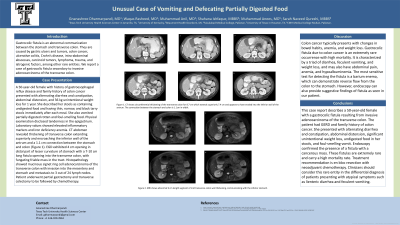Monday Poster Session
Category: Colon
P1705 - Unusual Case of Vomiting and Defecating Partially Digested Food
Monday, October 23, 2023
10:30 AM - 4:15 PM PT
Location: Exhibit Hall

Has Audio

Gnanashree Dharmarpandi, MD
Texas Tech University Health Sciences Center
Amarillo, TX
Presenting Author(s)
Gnanashree Dharmarpandi, MD1, Waqas Rasheed, MD1, Muhammad Anil, MD2, Shahana ishfaque, MBBS3, Muhammad Anees, MD1, Sarah Naveed. Qureshi, MBBS4
1Texas Tech University Health Sciences Center, Amarillo, TX; 2Beaumont Hospital, Dearborn, MI; 3Punjab Medical College, Faisalabad, Pakistan, Dearborn, MI; 4CMH Multan Institute of Medical Sciences, Multan, Pakistan, Beaumont, TX
Introduction: Gastrocolic fistula is an abnormal communication between the stomach and transverse colon. They are caused by gastric ulcers and tumors, colon cancer, ulcerative colitis, Crohn’s disease, intra-abdominal abscesses, carcinoid tumors, lymphoma, trauma, and iatrogenic factors, among other rare entities. We report a case of gastrocolic fistula secondary to invasive adenocarcinoma of the transverse colon.
Case Description/Methods: A 50-year-old female with history of gastroesophageal reflux disease and family history of colon cancer presented with alternating diarrhea and constipation, abdominal distension, and 36 kg unintentional weight loss for 1 year. She described her stools as containing undigested food and having thin, narrow, and black tarry stools immediately after each meal. She also vomited partially digested rotten and foul-smelling food. Physical examination disclosed tenderness in the epigastrium. Laboratory values showed elevated inflammatory markers and iron deficiency anemia. CT abdomen revealed thickening of transverse colon extending superiorly and encroaching the inferior wall of the antrum and a 1.1 cm connection between the stomach and colon (Figure 1). EGD exhibited 4 cm opening in distal part of lesser curvature of stomach with a 7-10 cm long fistula opening into the transverse colon, with fungating friable mass in the tract. Histopathology showed mucinous signet ring cell adenocarcinoma of the transverse colon with invasion into the mesentery and stomach and metastasis to 3 out of 24 lymph nodes. Patient underwent partial gastrectomy and transverse colectomy to be followed by chemotherapy.
Discussion: Colon cancer typically presents with changes in bowel habits, anemia, and weight loss. Gastrocolic fistula due to colon cancer is an extremely rare occurrence with high mortality. It is characterized by a triad of diarrhea, feculent vomiting, and weight loss, and may also have abdominal pain, anemia, and hypoalbuminemia. The most sensitive test for detecting the fistula is a barium enema, which can demonstrate reverse flow from the colon to the stomach. However, endoscopy can also provide suggestive findings of fistula as seen in our patient. Treatment recommendation is en bloc resection with neoadjuvant chemotherapy. Clinicians should consider this rare entity in the differential diagnosis of patients presenting with atypical symptoms such as lienteric diarrhea and feculent vomiting.

Disclosures:
Gnanashree Dharmarpandi, MD1, Waqas Rasheed, MD1, Muhammad Anil, MD2, Shahana ishfaque, MBBS3, Muhammad Anees, MD1, Sarah Naveed. Qureshi, MBBS4. P1705 - Unusual Case of Vomiting and Defecating Partially Digested Food, ACG 2023 Annual Scientific Meeting Abstracts. Vancouver, BC, Canada: American College of Gastroenterology.
1Texas Tech University Health Sciences Center, Amarillo, TX; 2Beaumont Hospital, Dearborn, MI; 3Punjab Medical College, Faisalabad, Pakistan, Dearborn, MI; 4CMH Multan Institute of Medical Sciences, Multan, Pakistan, Beaumont, TX
Introduction: Gastrocolic fistula is an abnormal communication between the stomach and transverse colon. They are caused by gastric ulcers and tumors, colon cancer, ulcerative colitis, Crohn’s disease, intra-abdominal abscesses, carcinoid tumors, lymphoma, trauma, and iatrogenic factors, among other rare entities. We report a case of gastrocolic fistula secondary to invasive adenocarcinoma of the transverse colon.
Case Description/Methods: A 50-year-old female with history of gastroesophageal reflux disease and family history of colon cancer presented with alternating diarrhea and constipation, abdominal distension, and 36 kg unintentional weight loss for 1 year. She described her stools as containing undigested food and having thin, narrow, and black tarry stools immediately after each meal. She also vomited partially digested rotten and foul-smelling food. Physical examination disclosed tenderness in the epigastrium. Laboratory values showed elevated inflammatory markers and iron deficiency anemia. CT abdomen revealed thickening of transverse colon extending superiorly and encroaching the inferior wall of the antrum and a 1.1 cm connection between the stomach and colon (Figure 1). EGD exhibited 4 cm opening in distal part of lesser curvature of stomach with a 7-10 cm long fistula opening into the transverse colon, with fungating friable mass in the tract. Histopathology showed mucinous signet ring cell adenocarcinoma of the transverse colon with invasion into the mesentery and stomach and metastasis to 3 out of 24 lymph nodes. Patient underwent partial gastrectomy and transverse colectomy to be followed by chemotherapy.
Discussion: Colon cancer typically presents with changes in bowel habits, anemia, and weight loss. Gastrocolic fistula due to colon cancer is an extremely rare occurrence with high mortality. It is characterized by a triad of diarrhea, feculent vomiting, and weight loss, and may also have abdominal pain, anemia, and hypoalbuminemia. The most sensitive test for detecting the fistula is a barium enema, which can demonstrate reverse flow from the colon to the stomach. However, endoscopy can also provide suggestive findings of fistula as seen in our patient. Treatment recommendation is en bloc resection with neoadjuvant chemotherapy. Clinicians should consider this rare entity in the differential diagnosis of patients presenting with atypical symptoms such as lienteric diarrhea and feculent vomiting.

Figure: Figure 1. CT scan with contrast showing gastrocolic fistula
Disclosures:
Gnanashree Dharmarpandi indicated no relevant financial relationships.
Waqas Rasheed indicated no relevant financial relationships.
Muhammad Anil indicated no relevant financial relationships.
Shahana ishfaque indicated no relevant financial relationships.
Muhammad Anees indicated no relevant financial relationships.
Sarah Qureshi indicated no relevant financial relationships.
Gnanashree Dharmarpandi, MD1, Waqas Rasheed, MD1, Muhammad Anil, MD2, Shahana ishfaque, MBBS3, Muhammad Anees, MD1, Sarah Naveed. Qureshi, MBBS4. P1705 - Unusual Case of Vomiting and Defecating Partially Digested Food, ACG 2023 Annual Scientific Meeting Abstracts. Vancouver, BC, Canada: American College of Gastroenterology.
